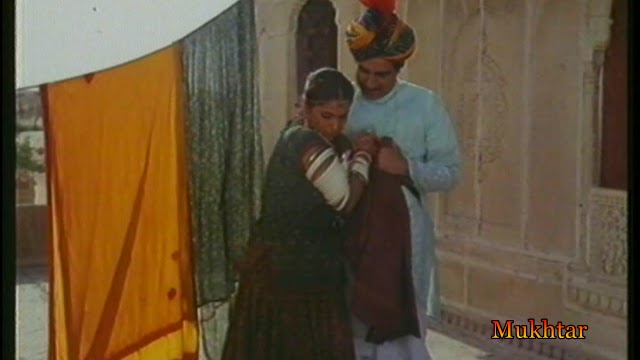LATA MANGESHKAR - Tumhain dekthi hoon to lagta hai aisey
Madhubala's gestures were so fascinating and adorable; no Bollywood actress could reach that level. The amazing Lyrics of this remarkable song by Naqsh Lyallpuri, marvellous composition by Jaidev and the innocent beauty of Madhubala all complement each other and are at the pinnacle.
I compiled this video on the outstanding song for my short-film "Madhubala and Dilip Kumar -- A LOVE STORY" -
http://www.youtube.com/watch?v=nIZI3WjaYzg
The Lyrics with possible English Translation are:
Tumhain dekthi hoon to lagta hai aisey
(Whenever I see you, I feel that.....
Keh jaisey yugooN se tumhaiN jaanti hooN
I know you through ages !)
Agar tum ho sagar,.... maiN pyasi nadi hooN
(If you are a sea......I am a thirsty-stream)
Agar tum ho sawan, .... main jalti kali hooN
(If you are rainy-season ... I am a burning bud !)
Piya tum ho sagar
Mujhey meri neendaiN, mera chen de do
(Please return me my sleep, give me my peace-----
Mujhey merey sapnooN ki ek raiyn de do na
please grant me one dreamful- night !)
Yehi baat pehley bhi tum se kahi thi
(I have requested you before also---
Wohi baat phir aaj dohra rahi hoon
I am again repeating the same today !)
Piya tum ho sagar
Tumhain chhoo ke pal meiN baney dhool chandan
(If the dust touches you, it will turn into sandal, right away
Tumhari mehek se mehekaney lage tann
with your aroma, my whole body smells very sweet !)
Mere paas aao, galey se lagao
(Please come close and embrace me-----
Piya aur tumse maiN kya chahh'ti hooN
My Love! I do not desire anything more than that !)
Muraliya samajh kar mujhe tum utha lo
(Please pick me up, considering me as your flute---
Bas ek baar hontooN se apney laga lo na
And put it on your lips, at least once !)
Koi sur to jaage,---- meri dhadkano mein
so that some note may resonate with my heart beat !)
Keh main apni sargam se ruthi hui hooN
Because I am at spar with my melody !)
MUKHTAR
Jaidev Verma (3 August 1919-6 January 1987) was born in Nairobi and brought up in Ludhiana, India. In 1933, when he was 15 years old, he ran away to Bombay to become a film star. There, he acted in eight films as a child star for the Wadia Film Company. Unfortunately, he had to leave his film career abruptly and return to Ludhiana, due to his father's blindness, putting the sole responsibility of his family on his young shoulders.
After the death of his father, Jaidev took the responsibility of looking after his sister. In 1943, he left for Lucknow to study under music maestro Ustad Ali Akbar Khan.
Ali Akbar Khan took Jaidev as his music assistant, in 1951, when he composed music for Navketan's 'Aandhiyan' and 'Hum Safar'. From film 'Taxi Driver' on, he became assistant to music composer, S. D. Burman.
His big break as a full-fledged music director came with Chetan Anand's film , Joru Ka Bhai, followed by Chetan Anand's next Anjali, both of these films became very popular.
Though it was with the film Navketan's Hum Dono (1961) that Jaidev true came into the limelight, with the songs like, "Allah Tero Naam", 'Abhi Na Jao Chhodkar", "Main Zindagi Ka Saath" and "Kabhi khud pe Kabhi Halat pe". His other big success came with Sunil Dutt star, Mujhe Jeene Do (1963).
Though many of Jaidev's films failed at the box office, many of them, such as Alap, Kinare Kinare and Ankahee, are remembered for his imaginative musical scores. He had a unique capability to mix traditional and folk music into bollywood film situations, giving him a unique advantage to other music directors of his times.
Jaidev never married, though he remained close to his sister's family, who later settled in the United Kingdom. He died on 6 January 1987, at the age of 68.
Naqsh Lyallpuri was born Jaswant Rai Sharma in Lyallpur ( my home town) , Punjab (now in Pakistan). His interest in literature, specially Urdu literature, started as a young boy. He became aware of his talent when his school teacher borrowed his notebooks at the end of the year because of the poems he wrote on them.
After Partition, he moved to Lucknow with his family. He moved to Bombay to find a job and ended up working at the Department of Post and Telegraph. He quit soon after thanks to the monotony of job and his keen interest in making a career in Hindi films. His film career began in 1952, when an introduction to film maker Jagdish Sethi led to his first song - “Agar Teri Ankhon Se Ankhen Mila Doon” (“Jaggu”, 1952). His first big hit came with “Main To Har Mod Par Tujhko Doonga Sada” (“Chetana”, 1970). That success led to work with bigger movies and bigger music directors and he went on to write several gems through the 1970s and early 80s including “Rasme Ulfat Ko Nibhaye” (“Dil Ki Rahen”, 1973), “Ulfat Mein Zamane Ki” (“Call Girl”, 1974), “Mujhe Pyar Tumse Nahi” (“Gharonda”, 1977) and “Na Jane Kya Hua” (“Dard”, 1981).
Disillusioned by the demands of producers to write crude lyrics, he retired from films and started writing lyrics for the title songs of TV serials where he was active for several years. In the 2000s he made a brief comeback writing for “Taj Mahal - An Eternal Love Story” (2005) for Naushad and “Yaatra” (2006) for Khayyam.




Mukhtarji, you captured well the essencial of Mathubala´s passion for Dilip Kumar. Madhubala is not acting, she is showing us her pure and innocent love for her idol. You superbly wrapped her happiness in an inspired lyrics and fascinating nature beauties. Aapne " Kuchh aisey aaj unki yaad dilaai / Mili ho jaisey doulat ek khoi."....
ReplyDeletehttp://www.youtube.com/user/musafir39